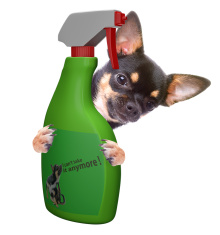Posts Tagged: pet safety
Microchip Your Pet: It Can Save Their Life
Is Your Pet Microchipped?
If the answer is “no” or “I am not sure”, now is the time to connect with us.

What Is A Microchip?
A microchip is a permanent form of identifcation for your pet. It is approximately the size of a grain of rice and is administered between your pet’s shoulder plades.
How Does It Work?
We never expect our kitty to sneak out the door as the kids are racing in and out of the house. We never expect our pooch to bolt when the fireworks go off. But it happens. If your furry family member gets out and is scooped up by animal control or brought into a vet clinic, they will scan him for a microchip. The microchip contains a unique identification code. This ID code is linked to your information. This allows you to be reunited with your pet fast!
Why Should I Have My Pet Microchipped?
One out of three pets will go missing in their lifetime. That’s scary. If your pet is microchipped, it increases the chances of being reunited by over 90%.
Do you know which day pets go missing the most? The 4th of July. That’s less than a month away.
I Want To Get My Pet Microchipped, What Now?
Set up an appointment with us and we can implant the chip. The cost of having the microchip implanted is $49.35.
To have the microchip registered, it typically costs $19.99. This month, we are covering the cost of registration for you!
April 26th is National Kids and Pets Day!
 National Kids and Pets Day is a fun day to celebrate the special bond that is held between our pets and kids. It also reminds us what pets can teach our children as they grow up.
National Kids and Pets Day is a fun day to celebrate the special bond that is held between our pets and kids. It also reminds us what pets can teach our children as they grow up.
RESPONSIBILITY: If your child is old enough to get involved with activities taking care of your pet, let her help! She can fill the water bowl, brush the fur, or help pick up the pet toys. As she grows older, she can assist with the feeding schedule, clean up feces from the yard, and even help with training.
COMPASSION: The compassion and nurturing that a child can learn from a pet will extend to other people as they grow, and even to their own kids one day.
HEALTH: In a world where technology is king, having pets can be a positive distraction from our devices. It’s also a great way to encourage the kids to get outside more!
SOCIAL: A pet can help teach a child social skills and build their confidence. Is your child learning how to read? Have her read a story to the cat! What’s better than having a best friend to talk to who will never judge you?
SAFETY: A pet helps teach our kids how to be safe with animals. As parents, it’s our responsibility to teach our kids how to interact with animals appropriately and always supervise their interactions. If you meet a new dog on a walk, does your child know to ask permission first before petting?
Thinking about adding a furry companion to your family? Consider adoption first.
Four Tips to Follow If Your Pet is Scared of Fireworks
The Fourth of July is a fun-filled summer holiday filled with barbecues, camping and of course, fireworks. While it may seem like a fun idea to take your pooch along to these festivities, dogs are more sensitive to noise than we are and don’t associate the noise and flashes of fireworks with celebrations. Dogs can be nervous of fireworks and may even panic at the loud bangs they produce.
If your pet is scared of fireworks, there are several things you can do:
1. Keep your pet at home. More pets go missing on the Fourth of July than any other day of the year. This is usually caused when pets panic from the noise of fireworks and dart to get away from the noise, winding up lost, injured or worse. Also, make sure your pet is microchipped. A microchip is a permanent form of identification for your pet. It increases the chance of a missing pet being reunited with his family dramatically.
Adaptil is a synthetic pheromone that mimics what a mother emits to her pups to help them feel comfort.
2. Make a safe, quiet space for your pet. Put their bed and a favorite toy in a quite corner or bedroom in your house. If their crate is a safe spot, drape a blanket over the top to protect them from any bright lights of the fireworks. Give them a special treat or bone when they are in their safe spot to help positively reinforce their safe spot.
3. Increase your dog’s sense of security by using the product Adaptil. Adaptil is a pheromone that mimics the natural pheromone released by a mother dog to reassure her puppies. This product can help reduce your pet’s stress level and help them feel more at ease. Adaptil comes in a collar, diffuser, or spray.
4. Set up an appointment with your Veterinarian. There are additional treatment options available if needed, to help your pet feel at ease during firework season.
We hope you all have a safe and fun holiday, and encourage you to take these 4 easy steps to help comfort your pets!
Top 5 Pet Poisons
March is Pet Poison Prevention Month. Like children, we must keep certain items out of reach of our pets in order to keep them safe. Some items you may be aware of their toxicity to pets and some may be a surprise. Continue below to find out if you know the top five pet toxins.
HUMAN FOODS: Many foods that are perfectly safe for humans can be harmful to our pets. These include:
- Chocolate

- Grapes and raisins
- Garlic and onion
- Yeast dough
- Any products containing the artificial sweetener, xylitol. (Found in a variety of foods from gum to toothpaste, including some brand of peanut butter)
- Pork products (Double check your treats and rawhide products as pork is a popular flavor used in pet products)
- Mushrooms
- Caffeinated items
- Nuts
HUMAN MEDICATIONS: There are several over the counter drugs and prescriptions that can do more harm than good. Please contact your veterinarian before giving any type of medication to your pet. Here are a few of the most common you should keep out of your pet’s reach:
- Acetaminophen (Tylenol)

- Ibuprofen
- Naproxen (Aleve)
- Antidepressants
- Pseudoephedrine
PLANTS: Greenery adds a little bit of extra life to our homes, but keep them up high and out of reach of your pets as they may find them to be a tasty snack.
- Lilies
- Azaleas
- Tulips

- Baby’s breath
- Carnations
- Hydrangeas
- Hyacinth
- Chamomile
- Ivy
AUTOMOTIVE PRODUCTS: Antifreeze and coolants, even in small quantities, can be fatal to your pet. Dogs and cats love the sweet taste of these toxic substances. keep those out of reach of your pet, and keep your pet away from the garage floor where the liquid may leak out of your vehicle.
OVER THE COUNTER FLEA AND TICK PRODUCTS: There are an overwhelming amount of options when it comes to flea and tick control. The products from your veterinarian are your safest options (Nexgard, Frontline Plus, Revolution and Seresto) when administered properly and with correct dosage. Many other flea and tick products that you can find at Wal-Mart or PetSmart you should avoid. Most of these products are ineffective and can have harmful side effects. Some of the most common brands you should avoid include: 
- Hartz
- Adams
- Sentry
If you are concerned that your pet may have been harmed by one of these products, please call your veterinarian immediately, or call the Pet Poison Helpline: 855-764-7661
